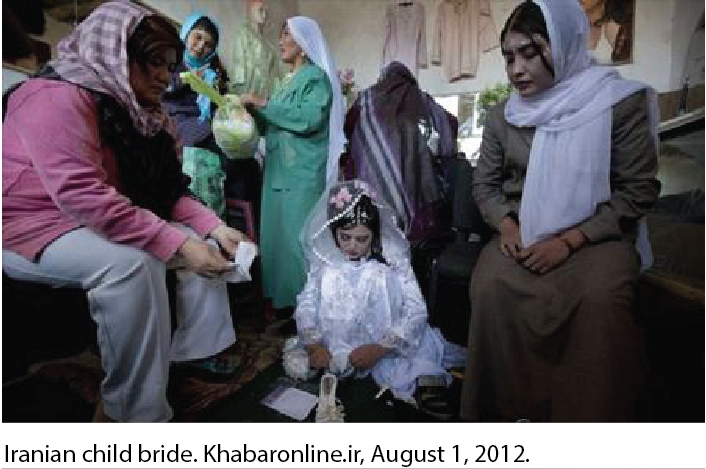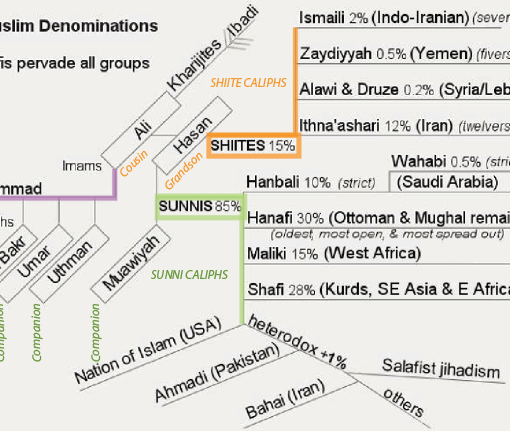 Today’s news headlines report that there were 40,000 male and female divorcees in Iran last year, adding to the 25% of marriages ending in divorce. Unlike in the West however, females can only initiate divorce proceedings with the husband’s permission. Divorces are mostly frowned on in Islam. In Islamic cultures only the male can initiate verbal divorce proceedings. A woman however, must petition to courts in oder to divorce her husband. Here are some of the grounds that the courts consider for granting a divorce to females:
Today’s news headlines report that there were 40,000 male and female divorcees in Iran last year, adding to the 25% of marriages ending in divorce. Unlike in the West however, females can only initiate divorce proceedings with the husband’s permission. Divorces are mostly frowned on in Islam. In Islamic cultures only the male can initiate verbal divorce proceedings. A woman however, must petition to courts in oder to divorce her husband. Here are some of the grounds that the courts consider for granting a divorce to females:
- castration of husband
- prison sentences longer than 5 years
- contracted infectious disease
- madness
- married again without first wife’s consent
The Mother‘s custody for children ends at 2 for boys and 7 for girls and reverts to the father—so it is the father who has control of the lives of the children. If the mother remarries she loses all rights to her children.
Maintenance is considered the highest order financial liability against any husband at law.
Marriages between Muslim women and non-Muslim men are not recognised—along with hereditary rights.
The marriageable age for females is nine.
Temporary marriages are allowable for men to seek prostitutes (who are not slaves)
Points for consideration: Marriage customs vary across the world and across religions. In Australia as in the UK reports are coming out where Islamic girls are being married only in mosques and not registered as married under Australian or UK Law—thereby waving all their marriage and property rights under that law.
Does Australia like the UK recognise child marriages for Shiites or any other Islamic refugees just because it was legally accepted in their place of origin. What happens if they want to bring their child brides or multiple brides as legitimate wives. Does Australia law count in these circumstances.
Here are the specifics on Shiite divorce from Iran:
Marriage Age: Civil Code provides that marriage contracted before puberty is invalid unless authorised by natural guardian with ward’s best interests in mind. When authorised before puberty, minimum age is nine.
Marriage Guardianship: marriage of virgin girl (even after puberty) requires permission of father or paternal grandfather; Special Civil Court may grant permission if guardian refuses without valid reason.
Marriage Registration: Identity Office must be notified of all temporary or permanent marriages and their dissolution. Marriages between Muslim women and non-Muslim men are not recognized. Bahai marriages are not recognized.
Temporary Marriage: permitted; must be for fixed time period.
Polygamy: wife may obtain divorce if husband marries without her permission or does not treat co-wives equitably in court’s assessment.
Obedience/Maintenance: subject to classical conditions; wife who is not nashiza may take matter to court if husband refuses to pay maintenance and court will fix sum and issue maintenance order arrears of maintenance to wife have precedence over all other liabilities against husband; in temporary marriage, wife only entitled to maintenance if contract stipulates such; husband may deny his wife right to work in any profession “incompatible with the family interests or with the dignity of himself or of the wife”; wife’s refusing conjugal relations where husband has contracted venereal disease not deemed disobedience.
Talaq: governed by classical Shi’i law requiring specific formula and two male witnesses; conditional divorce is invalid; 1992 reforms make registration of divorce without court certificate illegal; wife may obtain khol- divorce in return for consideration of more or less than nuptial gift (mahr);
Judicial Divorce: under Civil Code, recission of marriage permitted on following grounds: proven insanity of either spouse; husband/s castration or inability to consummate marriage; defect of the wife interfering with conjugal relations or her total blindness, contracting leprosy or becoming seriously crippled if they existed at time of contract; husband’s inability or unwillingness to pay maintenance, after failure to comply with maintenance order; and in final instance, where continuation of marriage constitutes proven difficulty or hardship for wife, judge may compel husband to divorce wife or grant her a judicial divorce”
1992 amendments extend wife/s access to divorce by addition of following grounds: husband’s non-maintenance for up to six months for any reason; husband’s bad behaviour, keeping bad company, etc. making continuation of married life impossible for wife; husband’s incurable disease constituting danger to wife; husband’s madness in cases where annulment would not be possible according to shari’a; husband’s non-compliance with court order to avoid demeaning or dishonourable employment; husband’s conviction to sentence of five or more years; husband’s addiction constituting a danger to family and marriage (determined by court); husband’s desertion or leaving marital home for six months without legitimate cause (determined by court); husband[s conviction for crime bringing dishonour to family (determined by court); husband’s infertility for five years of marriage or his contracting sexually transmitted disease; husband’s disappearance for six months; and husband’s polygamous marriage without first wife’s consent, if court considers co-wives are not being treated equally.
Post-Divorce Maintenance/Financial Arrangements: 1992 amendments extended divorced wifes financial rights from maintenance during ‘idda and deferred dower, to right to claim compensation for household services rendered to husband during marriage.
Child Custody and Guardianship: mother’s custody ends at 2 years for boys and 7 for girls; custody reverts to father if mother remarries. Mother may be granted custody in certain cases if the father is proven unfit to care for the child.
Succession: governed by classical law; descendants (how low soever) of predeceased children of propositus inherit in place of their parents. Children of Baha’i marriages are not recognized as legitimate and, therefore, are denied inheritance rights.
SOURCE:



